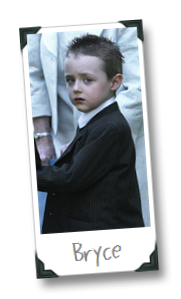 Bryce was born July 2nd, 2001 at 7:06am. He weighed 7 pounds, 7 ounces and was 19.5 inches long. He was a very happy baby, always smiling and cooing and slept through the nights. People would always comment how happy and relaxed he was compared to other babies.
Bryce was born July 2nd, 2001 at 7:06am. He weighed 7 pounds, 7 ounces and was 19.5 inches long. He was a very happy baby, always smiling and cooing and slept through the nights. People would always comment how happy and relaxed he was compared to other babies.
This is Bryce’s story.
When Bryce was 12 months old, it was brought to our attention, from a pediatric physiotherapist that regularly visited the daycare Bryce attended, that Bryce had a tendency of looking at things through his peripheral vision instead of making direct eye-contact. It was her recommendation to speak to our pediatrician as she said it wasn’t typical. Bryce had all his vaccinations, recommended by his pediatrician, and he met his baby milestones like crawling and baby talking. Anything we thought he may be behind on learning was disregarded by people telling us that all children are different and learn at different times. We didn’t know any better as young, first time parents.
After meeting with our pediatrician, he had expressed some concerns about mild developmental delay primarily involving gross motor and personal/social skills. He felt this was probably associated with mild hypotonia (low muscle tone), and placed Bryce at the eight to nine month-old level. As a follow up to some of these concerns, our pediatrician wanted Bryce to be screened for metabolic disorders, chromosomal abnormalities, hypothyroidism, and seizures. All the tests came back normal.
Bryce had little development in communication and social behaviour but improved in gross motor skills yet hadn’t started walking. Bryce was 18 months old and it wasn’t until I was fed up with carrying him and pushing strollers everywhere that I physically put him against a door and made him walk to me repeatedly until he figured out that he had legs, and that’s what they were used for. It was at this time that we discovered that Bryce had to be pushed and taught skills that 'typical' developing children pick up naturally by observing parents and peers. From that day on Bryce would walk everywhere.
In February 2003, a subsequent referral to another pediatrician indicated that Bryce had a “global developmental delay and some abnormal mannerisms” that needed further investigation. She was concerned about Bryce’s language development, social development and thought he had possible features of autism. She ordered similar lab work to the previous pediatrician, put in a referral to have Bryce’s hearing checked, and began the process for having him enrolled in the Infant Development Program. The lab work produced unremarkable results and his hearing was deemed normal.
She made a referral in June 2003, when Bryce was almost 2 years old, for a full developmental assessment at Sunny Hill Health Centre for Children because of the pediatric physiotherapist that expressed concerns about autistic features she observed in Bryce at daycare. The pediatric physiotherapist reported: frequent sideways cocking of the head while looking at lights; lack of eye contact; no words; inability to follow commands; delayed gross motor milestones; fascination with wheels, tags, and fans; and self-feeding with fingers only (no utensils).
Bryce was almost 3 years old when we finally got to see Sunny Hill Health Centre for Children for diagnostic testing. These tests included simple tasks like putting a Cheerio into a small glass container, to test his fine motor skills, and then seeing if he could get the Cheerio out, using problem solving, by turning the container over. They also used blocks to test his ability to sort by color and shape, ability to stack vertically opposed to lining them up horizontally, and ability to recognize patterns and copy them. The majority of the diagnostic tests were play based due to his young age and lack of verbal or signing communication skills. A month later, we sat down in a little room with a doctor, and were informed of Bryce’s results.
On June 9th, 2004, Bryce was diagnosed with Autism Spectrum Disorder by the Pacific Autism Resource Centre at Sunny Hill Health Centre for Children. The summary said that he displayed several features consistent with autism spectrum disorder including, delayed language, limited eye contact, self-stimulating behaviour, repetitive play, and delayed pretend play skills. His receptive and expressive language skills were also severely delayed and based on his age, his symbolic abilities, such as pretend play, were also delayed.
I remember crying and feeling so sad and not fully understanding what it is that they were telling me. We didn’t know anything about autism, but anything labeled as a disorder couldn’t be a good thing. I remember thinking to myself about the future and what was going to happen. We were told not to look too far ahead and to take each day by day.

No comments:
Post a Comment
Please feel free to leave a comment about this post.
Note: Only a member of this blog may post a comment.